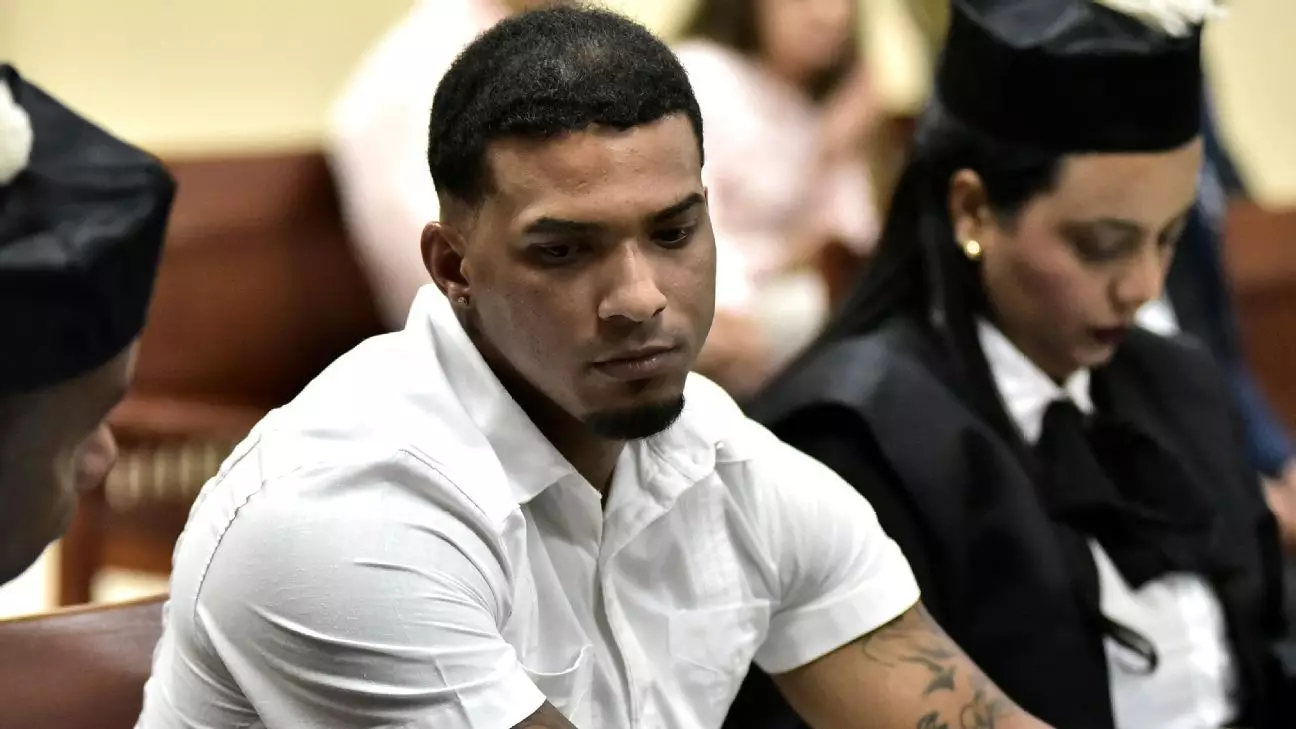Wander Franco, a name that once represented hope and expectation in Major League Baseball, has now become emblematic of a harrowing scandal that has tarnished both his career and legacy. The Tampa Bay Rays’ shortstop was recently convicted of engaging in sexual activities with a minor, an act that has sent shockwaves through the sports community and led to a troubling reflection on the systems surrounding athletes and their accountability. This situation underscores a need for a more stringent approach to the protection of vulnerable individuals in both society and sport.
Franco’s conviction came as prosecutors attempted to secure a five-year prison sentence, but the judge opted for a suspended two-year sentence, pivoting on the premise that Franco would only serve time should he infringe upon specific legal stipulations. This leniency is both disconcerting and indicative of the judicial complexities surrounding cases that involve celebrities. One can’t help but wonder if the societal status of an athlete has unfairly softened the repercussions they face for grievous misconduct.
The Role of Accountability
The facts of the case paint a disturbing picture: Franco had sexual relations with a 14-year-old girl when he was 21 years old. This predation was facilitated through online interactions, culminating in physical rendezvous that were enabled by extravagant means—he allegedly sent helicopters and vehicles to transport her for private encounters. The sheer audacity of these actions, enhanced by the resources at his disposal, raises pressing questions about moral responsibility. When star athletes engage in illegal acts, the expectations are not just about personal rectitude but reflect broader societal norms regarding youth protection and accountability.
Moreover, the conviction of the victim’s mother for sexually trafficking her daughter adds another layer of complexity to the narrative. Martha Vanessa Chevalier Almonte was sentenced to ten years in prison, drawing attention to the often-overlooked issue of parental involvement in the exploitation of children. This raises deeper philosophical questions: What drives a parent to betray the sanctity of their relationship with their child for financial gain? The intertwining of their cases unveils a disturbing cycle of exploitation that necessitates more significant scrutiny and reform.
The Fallout of Fame
As Franco grapples with the repercussions of his conviction, the implications extend beyond the courtroom. He currently finds himself on Major League Baseball’s restricted list, a decision that may complicate his future within the sport significantly. Receiving a work visa in the United States seems unlikely, reflecting the broader ramifications of his actions—intended not just to punish an individual but to protect a sport that stands as a beacon for millions of fans, particularly younger ones.
The situation accentuates the dire need for a rigorous and unequivocal stance on misconduct within professional sports. MLB’s ongoing investigation signifies that the league must contend with its policies on domestic violence, sexual assault, and child abuse—issues that have been prevalent but inadequately addressed in the past. With Franco’s career seemingly sidelined, fans and stakeholders are left to ponder a broader truth: should the allure of athleticism exempt players from facing the full weight of their actions?
The Dark Side of Sports Stardom
A rising star once celebrated for his skills, Franco is now scrutinized for his moral failings. His rise to fame—starting from a lucrative $3.8 million signing as a 16-year-old, to an impactful All-Star season—evokes the harsh reality that sometimes, the very adulation that athletes receive can be a double-edged sword. With fame often blinding individuals to the consequences of their actions, we must ask ourselves what mechanisms can be put in place to safeguard both athletes and ordinary citizens from such predatory behavior.
As the world of sports continues to navigate the complex relationship between fame, accountability, and personal responsibility, the case of Wander Franco serves as a grim reminder that the consequences of betrayal can extend far beyond the individual—affecting families, communities, and fans alike. In an era where athletes wield considerable influence and power, the call for deeper accountability, particularly regarding actions that exploit the vulnerable, is more urgent than ever. As Franco’s story unfolds, it is a clarion call for change in the athletic culture; one that should champion integrity and protect those who cannot defend themselves.

